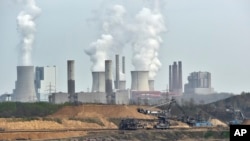As clocks passed midnight into Friday, remote islands in the Pacific Ocean, many in danger of rising seas from global warming, kicked off a rolling start as last year's global agreement to slow climate change took effect.
The 2015 Paris Agreement formally started on November 4, 2016, after winning support from major greenhouse gas emitters led by China and the United States, but legal texts do not specify a time zone where it begins.
As a result, it came into effect first in the Pacific region, home to low-lying island states on the front lines of storm surges, disruptions to rainfall and a creeping rise in sea levels.
The eastern islands of Kiribati were among the first, followed by countries such as Tonga, Tuvalu and the Marshall Islands.
Islands are "vulnerable"
Going into effect in the Pacific “which is home to vulnerable island nations who have all ratified the agreement, makes for one of those serendipitous moments in history,” Thoriq Ibrahim, environment minister of the Maldives in the Indian Ocean, told Reuters.
Ibrahim will chair the alliance of small island states at talks among almost 200 nations in Marrakesh from November 7-18 to try to find ways to implement the Paris Agreement, partly by working out rules for an often vague text.
The Paris Agreement seeks to wean the world economy off fossil fuels in the second half of the century and limit a rise in average world temperatures to "well below" 2.0 degrees Celsius (3.6 Fahrenheit) above pre-industrial times.
On Thursday, however, the United Nation said greenhouse gas emissions in 2030 will exceed by 12 billion to 14 billion tons what is needed to keep global warming to the agreed target.
The agreement is formally starting 30 days after it passed a threshold of 55 nations accounting for more than 55 percent of greenhouse gases.
Trump wants out of deal
Shadowing the agreement, however, is the possible election of Republican Donald Trump, an opponent, as U.S. president.
In theory, it takes four years of legal formalities to withdraw after it enters into force.
But Trump, who has said he doubts humans have caused climate change, wants to extract the United States from the Paris deal.
Democrat Hillary Clinton strongly supports the agreement. U.S. climate envoy Jonathan Pershing said on Thursday that even if Trump wins the presidential election, he would see practical incentives to stick with the deal. He said that more is invested globally in renewable energy than fossil fuels.
“There are going to be huge domestic advantages to staying
in this agreement,” he said.









